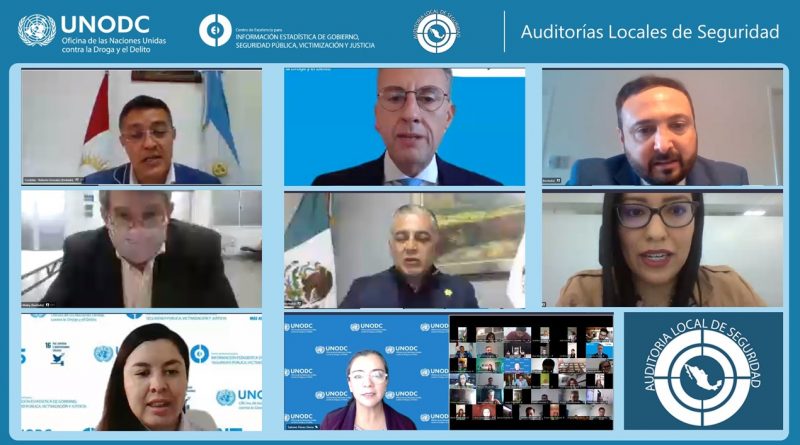Conversatory about the Local Safety Audit in Queretaro
Mexico City, November 10, 2020. The Center of Excellence carried out a Conversatory about the Local Safety Audit in Queretaro (Mexico) and the progress of the Ministry of Public Security of Queretaro Municipality (SSPMQ) on gender issues. With the participation of staff from the Ministry of Security, the Secretariat of Citizen Participation, as well as leaders from the executive, legislative and judicial branches and members of civil society in Tucuman, this conversatory took place in the framework of the Initiative to strengthen security governance on gender issues in Tucumán-Argentina.
Mr. Roberto González of the Observatory for Studies on Coexistence and Citizen Security of Argentina welcomed the authorities and thanked the representatives of the municipality of Querétaro for sharing their experience on the implementation of the Local Safety Audit.
The UNODC representative for Peru and the Southern Cone, Mr. Antonino De Leo, mentioned that Local Safety Audits are a methodological tool, promoted by the United Nations for based in evidence decision making. He pointed out that crime reduction and prevention requires a thorough knowledge of crime and its behavior at the local level, which is why audits are based on the creation of solidarity networks among various actors in society, the efficient use of data and the strengthening of capacities from an integral perspective.
The Secretary of Citizen Participation of the Ministry of Security of Tucumán, Mr. José Farhat, shared the work model they have implemented, based on a methodology of neighborhood action with innovative techniques of collective work from an institutional, strategic and tactical level, focusing on culture. He commented that during the pandemic by Covid-19 their actions have been working on the construction of spaces for the solution of violence problems, to generate resilience and a greater interaction in digital environments. He addressed that everything that has been done is the result of the efforts of various actors who have collaborated closely and he assured that the initiative to strengthen the governance of gender security in Tucuman-Argentina is a contribution to provide more and better solutions.
Mrs. Salome Flores, National Program Officer and Coordinator of the Center of Excellence-UNODC, presented each of the six stages of the Local Safety Audit implemented in Queretaro and mentioned the Evaluation of Urban Security Governance in the Municipality of Iztapalapa as another exercise that seeks to strengthen crime prevention programs at the local level, coordination among actors, identification of local challenges, strengthening of institutional capacities and community resilience.
Mr. Claudio Maoley, Minister of Security of the Province of Tucuman, Argentina, thanked for the invitation to the different agencies for work together to find solutions and reverse actions that harm healthy coexistence of society. He mentioned the importance of generating spaces to reduce violence at all levels, especially gender and institutional violence, sharing his full support for the implementation of the initiative in collaboration with the authorities of Tucuman and UNODC.
Also, Mr. Juan Luis Ferrusca Ortiz, Secretary of Public Security of Queretaro Municipality, shared his experience of collaboration with the UNODC and noted that the recommendations resulting from the diagnosis were included in the Municipal Security Program. Some of the most relevant improvements have been the strengthening of networks between the population and the specialized police, better technology and more trained personnel.
Mrs. Adriana Alicia Garcia Montes, Director of Victims Attention of the Secretary of Public Security of Queretaro Municipality, spoke about the creation of the Directorate for Attention to Victims of Domestic Violence and Gender, which is structured in 3 departments: Protective Measures, Search of Persons and Interdisciplinary Area. She also mentioned the protocols established for action and highlighted that some of the most visible results have been the strengthening of human resources, allowing a monitoring exercise and had provide a bigger attention to the victims of violence.
Within the framework of the Initiative to strengthen security governance on gender issues in Tucumán-Argentina, alliances between Mexico and the countries of the region will continue to be strengthened for the exchange of good practices for security, crime prevention and attention to victims of gender violence.



